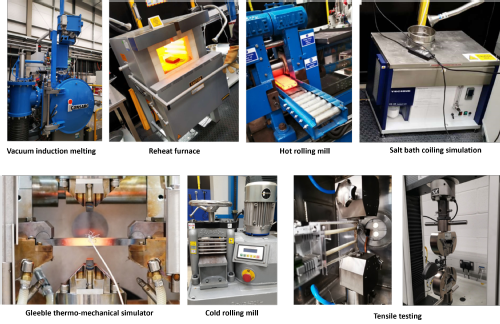Expressing steely determination to innovate
Working with partners in the steel industry, WMG has been accelerating the development and optimisation process for steel products.
Background
Fierce international competition and high domestic costs hamper UK steel production.
Facing such headwinds, innovation and efficiency of operations are vital to remain competitive when producing steel in the UK.
Research at WMG demonstrates its commitment to UK steel industry remaining competitive in a difficult global market.
Challenge
The development of new steel grades is expensive and time-consuming, typically taking around 18 months from concept to commercialisation.
Around half this time is spent on pilot plant and mill trials, along with the costs associated with a typical minimum production of almost 1000 tonnes of development material.
WMG’s challenge was to find a solution to accelerate the development and optimisation process for new steel grades. One such route would be an ability to trial new ideas on a small-scale laboratory capability, that whilst representative of industrial processing would allow faster adoption of new grades and give new opportunities to trial more adventurous products.
Solution
Utilising existing equipment at WMG, a grant from the EPSRC Strategic Equipment Fund, and support from the High Value Manufacturing Catapult, WMG established a laboratory-scale representation of industrial practices along with a digital twin of the processes.
The initiative secured involvement from industrial partners Tata Steel and Liberty Steel, each providing WMG with detailed information and data on industrial process route parameters and grades including statistical data, along with industrial samples. Each also supported with necessary compositional analysis to benchmark measurements in the lab and large-scale forging, as required to pre-condition samples before the small-scale rolling simulations.
On completion of the benchmarking, several new compositions and process parameter optimisations were investigated using the new Rapid Alloy Prototyping (RAP) process.
As an industrially-benchmarked process route for small-scale production of steel strip and large bar, WMG’s RAP facility allows laboratory-scale improvements to be realised and rapidly translated to full-scale production.
The successful initiation and delivery of the project can be attributed to the strong relationships and extensive collaborations cultivated through previous projects, reinforced by WMG's significant expertise in the subject area and its world-leading facilities. The industrial partners demonstrated their confidence in WMG to deliver results by co-funding associated work in this area.
Impact
The project has supported the development of new steel grades and process optimisation at Liberty Steel and suggested plant trials at Tata Steel.
Developed using the RAP, Liberty Steel have a new steel composition which has already seen commercial use in aircraft components. This achievement was completed in under 12 months, a timeframe previously without precedent.. This was achieved by obtaining a better understanding of process routes to allow optimisation and reducing excess processing or even scrappage, promoting improved sustainability.
In addition, research has led to an increased understanding for plant operatives of how process parameters affect product performance, which will further reduce development times through RAP.
Process optimisation has reduced energy use, decreasing energy costs and improving business sustainability.
Further exploitation is ongoing through an EPSRC Prosperity project with Tata Steel, and a new Tata Steel-HVM Catapult strategic partnership programme.
“The RAP line at WMG has been developed and benchmarked against our strip steel production at both Port Talbot and Trostre works and allows us to optimise existing steel grade properties via alloy and process optimisation as well as exploring new metallurgical concepts in a rapid and less risky manner.
The RAP route has provided important insights into our current processing lines, from hot band to properties exiting the continuous annealing process as well as giving us the opportunity to further study impact of residual steel scrap elements on final properties. The WMG RAP line has also allowed us to trial new ideas that are now being considered for scale up into industrial plant trials.
This small-scale experimental line (max 10kg ingot/80mm width) acting within its process boundaries, when combined with physical metallurgy principles, thermo-mechanical simulators and modelling can be used as true simulation physical twins for alloy design.”
(Didier Farrugia, Scientific Fellow at Tata Steel RD UK).
Conclusion
WMG's research resulted in a transformation in product development and process optimisation.
Tata Steel and Liberty Steel have benefitted both technically and commercially, Research in steel innovation is continuing with further collaborative WMG-industry programmes.
Collectively, these remarkable achievements pave the way for a more efficient, sustainable, and commercially successful future for the UK steel manufacturing industry.
END
Recognition is given to support provided to WMG by the High Value Manufacturing Catapult, Tata Steel, Liberty Steel, EPSRC, and Royal Academy of Engineering.
For more information, or to work with WMG, contact us at wmgbusiness@warwick.ac.uk


